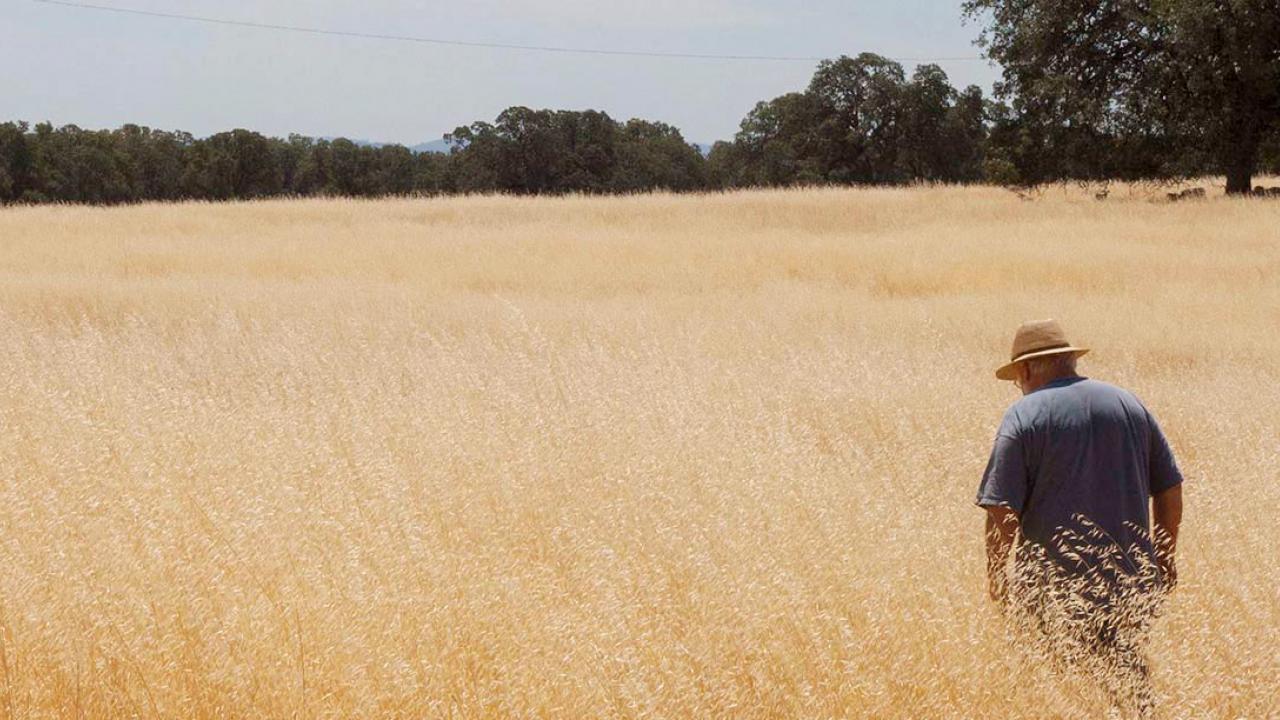Mel Thompson's Story
Brad Hooker/UC Davis Plant Sciences
(4 min 6 sec)

While a severe drought continues to devastate California agriculture, one sheep rancher in Oroville has found a centuries-old solution at the bottom of his wood stove — and researchers at UC Davis are paying attention.
After dumping ash from a weekend cookout in his backyard, Mel Thompson noticed the grass grew a little better. On the advice of Glenn Nader, a UC Cooperative Extension farm advisor based in Yuba City, Thompson took the initiative to research wood ash on his own, going as far as to establish a connection with an Oroville-based energy plant 20 minutes away, which was paying millions to deliver wood ash to the landfill.
Today, the difference in growth from that wood ash can be seen in two adjoining pastures on Thompson’s foothill ranch. One layered in ash three years ago has chest-high grass despite the drought, while the untreated pasture has considerably shorter ground cover.
While the benefits of supplementing crops with ash have long been known, the UC Davis researchers were interested in specifically how it was altering the soil composition to promote plant growth and how it could help other ranchers in this Northern California region.
‘Doing OK’ in the drought
“It has improved our feed production significantly,” says Thompson. “With that, in conjunction with fencing and the rotational grazing, we seem to be doing OK through this drought period.”
Ken Tate, a plant sciences professor and a Cooperative Extension rangeland watershed specialist, recently surveyed more than 500 ranchers and says Thompson falls into the roughly 5 percent of California ranchers practicing these types of strategies in hopes of gaining more productivity from their land.
“Mel is what we call an early adopter, someone who has a large toolbox and a lot of information that he makes use of,” Tate says. “He’s an innovator and experimenter in the industry.”
An exemplary model for agriculture
It is Thompson’s use of resources that Tate says makes him an exemplary model for a project the professor started in February called Farmer and Rancher Voices from the Drought.
Tate, who grew up in Oklahoma hearing stories of the Dust Bowl, knew before 2014 began that it would likely be a harsh year because of the drought. Nearly all the ranchers he surveyed were worried.
He assembled a team to document the stories of farmers and ranchers, how each operation deals in its own way with the drought and what can be learned.
The UC Davis team highlights ranchers like Mel Thompson through audio interviews posted on SoundCloud, with the hope that others will post their own stories. Another UC Davis site, California Drought Watch, is also highlighting these interviews.
Ranchers individually handle drought
“We don’t have a perfect scientific answer for which is the best strategy for drought resilience on every individual ranch; we provide tools and ideas for ranchers to use during drought” Tate says.
Linking UC Davis experts with ranchers
The goal of linking a rancher to farm advisors and faculty members in order to study the best practices for a specific operation is what Cooperative Extension farm advisor Nader praises as a prime example of Cooperative Extension.
“We have a connection with people in the field who have problems, who are challenged by their producers,” he says.
“We then challenge campus faculty and specialists to come up with basic research that works into applied solutions.”
Working with rangeland ecologist
Along with ash, Thompson has fenced off his rangeland into separate paddocks for rotational grazing, which allows the grass to recover. These unconventional strategies rose to the attention of Valerie Eviner through the California Rangeland Conservation Coalition.
Eviner, an ecologist and associate professor in plant science at UC Davis, was surprised by how relaxed Thompson was in allowing her to set up test plots — even permitting weeds to flourish in places.
Though Eviner’s soil experiments were hampered by inconsistent rainfall, her project paved the way for future research.
“He’s really taken this as a very cool opportunity to expand our knowledge of what may or may not work,” says Eviner. “It suggests he’s got unbridled intellectual curiosity and he wants to learn, to understand the system.”
UC Davis is growing California
At UC Davis, we and our partners are nourishing our state with food, economic activity and better health, playing a key part in the state’s role as the top national producer for more than 50 years. UC Davis is participating in UC’s Global Food Initiative launched by UC President Janet Napolitano, harnessing the collective power of UC to help feed the world and steer it on the path to sustainability.
